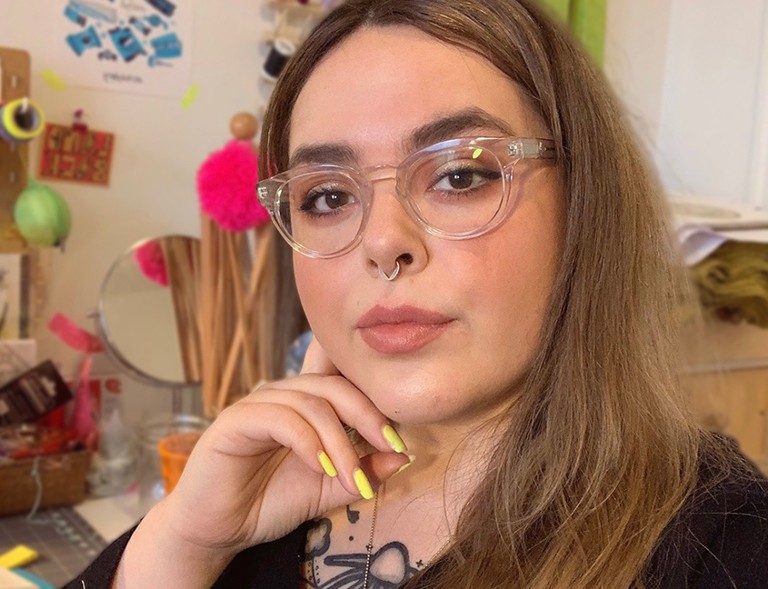Indigenous Student Librarian Program welcomes Rudi Aker to the Concordia Library
 Rudi Aker: “Working at the Library is an invaluable complement to my studies.”
Rudi Aker: “Working at the Library is an invaluable complement to my studies.”
The tri-university Indigenous Student Librarian Program, now in its seventh year, has brought yet another Master of Information Studies student to work at the Concordia Library.
McGill University grad student Rudi Aker, BFA 22, began at the Library last fall. Aker is Wolastoqiyik from Sitansisk (St. Mary’s First Nation) — a Wolastoqey community in Fredericton, New Brunswick.
“The program’s importance continues to grow as the Library actively looks at ensuring our staff is representative of the broader community,” says university librarian Amy Buckland, BA 06.
“Having different stories and voices on staff helps us be more welcoming to students. It also brings new experiences and expertise to Concordia.”
Under Buckland’s mentorship, Aker is working part-time as a student librarian at Concordia.
“Working at the Library is an invaluable complement to my studies,” they say.
“The librarians at Concordia are so wonderful and welcoming. I’ve been fortunate to be invited to work with many of them on a variety of different projects, both on a long and short-term basis.”
The program is a partnership between Concordia, McGill, and the Université de Montréal. The initiative, launched in 2017 as part of the Indigenous Directions Action Plan, was designed to support a First Nations, Métis or Inuk student in getting hands-on experience while completing their studies.
The project is also intended to foster a culture of diversity and inclusion within the Library team and the field as a whole.
“I want to know and witness more Indigenous librarians, more queer and trans librarians, more disabled librarians — among so many others who also exist within the intersections of identities,” Aker says.
“What I want more is for those same people to feel supported, safe and comfortable in whatever profession they choose. I want them to feel confident in knowing that the diversity, equity and inclusion of their career, field or workplace doesn’t rest solely on their shoulders.”
The two-year program provides participating students with practical work experience and a paid position, plus benefits. Additionally, their contributions are welcomed at the Library through special projects.
“Students learn from our fantastic staff and get to see what actual library work is like,” says Buckland.
“They are able to see how their previous experiences intersect with library work and how their particular talents may be needed. They can also begin to develop a sense of their future in the field.”
Buckland relates that the Library will be looking at how it is creating resources for First Nations, Métis and Inuit audiences, ensuring it does this in partnership with these communities. The Library is seeking to rethink many of its processes as part of an overall effort to decolonize this work.
“To engage in meaningful and sincere efforts toward more diversity and inclusion, we also have to interrogate the systems of power that have allowed for a historical and ongoing lack,” Aker says.
“Diversity and inclusion need to be applied rather than implied. These processes require long-term dedication to access and equity, especially in supporting the people who fulfill those roles.”
Aker says they are specifically looking forward to contributing to the Library’s offerings on data sovereignty and relational citation, as these are some of their personal and professional areas of interest.
Aker also notes that they are eager to learn more about how these topics fit into the Library’s resources when it comes to further supporting research by and for Indigenous people and communities.
“Rudi’s Library colleagues have included them in a number of projects from collection development to building Library guides, offering them experiences in a large variety of Library work,” Buckland says.
“Rudi will be working on a guide related to data sovereignty — something that we have only begun to address — and I am particularly thankful to have their input on this topic.”
The call for applications to the Indigenous Student Librarian Program for the 2024-25 season is now open until March 1 at 5 p.m.
“I strongly encourage more Indigenous students to consider librarianship as a career pathway,” Aker says. “We need more representation in spaces like these, especially in academic libraries.”
“This program is a great opportunity to gain experience, develop skills, and make connections.”
Apply to the Indigenous Student Librarian Program for the 2024-25 season.
Learn more about the Concordia Library.




